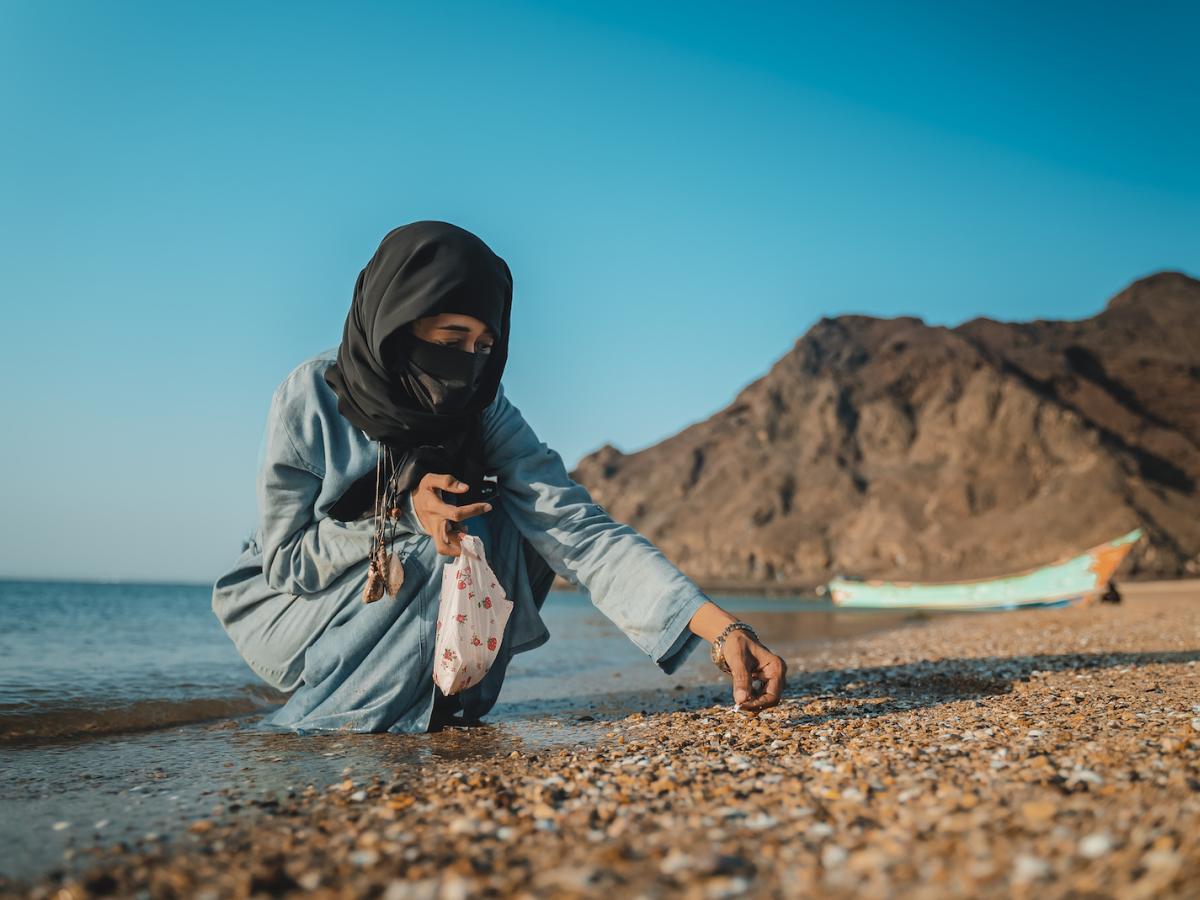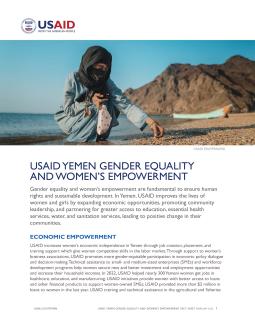Gender equality and women’s empowerment are fundamental to ensure human rights and sustainable development. In Yemen, USAID improves the lives of women and girls by expanding economic opportunities, promoting community leadership, and partnering for greater access to education, essential health services, water, and sanitation services, leading to positive change in their communities.
ECONOMIC EMPOWERMENT
USAID increases women’s economic independence in Yemen through job creation, placement, and training support which give women competitive skills in the labor market. Through support to women’s business associations, USAID promotes more gender-equitable participation in economic policy dialogue and decision-making. Technical assistance to small- and medium-sized enterprises (SMEs) and workforce development programs help women secure new and better investment and employment opportunities and increase their household incomes. In 2022, USAID helped nearly 300 Yemeni women get jobs in healthcare, education, and manufacturing. USAID initiatives provide women with better access to loans and other financial products to support women-owned SMEs; USAID provided more than $2 million in loans to women in the last year. USAID training and technical assistance in the agricultural and fisheries sectors is creating viable and sustainable livelihoods for women. In 2022, USAID provided training on agricultural productivity and food security to more than 1,700 women.
COMMUNITY LEADERSHIP
USAID prioritizes the inclusion of women in community engagement to ensure their voices contribute to resolving local grievances and strengthening social cohesion. To ensure women’s viewpoints, concerns, and priorities are considered, USAID promotes women decision-making through greater participation in political and social circles; incorporates more women as community organizers and project leaders; organizes women-specific community outreach events; and encourages men to advocate for women’s rights. Through small grants, USAID has supported 25 initiatives over the past two years to increase participation of women and youth in community peacebuilding initiatives and civic engagement for greater social cohesion. New programs, launched in early 2023, will support women within government and civil society to participate safely and meaningfully in governance, peace, and political processes. Programs will also partner with women-led community-based organizations to strengthen community resilience and advance local peace and reconciliation efforts.
ACCESS TO SERVICES
Education
In Yemen, the odds are stacked against a girl’s access to education. High rates of child marriage among girls and a prioritization of education for boys over girls has led to plummeting enrollment rates for girls as compared to boys. There is also a shrinking space for girls’ education in areas controlled by conservatives and extremists. In addition, there are growing safety concerns and limited transportation options, a lack of functioning toilets in schools, and increased risks of gender-based violence in schools. Collectively, these conditions contribute to a growing gender gap in enrollment and higher dropout rates for girls. USAID’s education programs help address these challenges by improving access to quality education for all. USAID supports families and communities to create safe learning spaces that prioritize the needs of women and girls; training parents and community members on child protection with a special focus on girls and gender inclusivity in both formal and non-formal education settings; and providing remedial/alternative learning programs, which increase enrollment and retention for girls. In 2022, USAID established 50 girls groups and 42 student councils through election processes in 92 schools, providing opportunities for female leadership; and provided critical safe spaces to discuss issues such as forced early marriage and gender-based violence. USAID-funded remedial education classes reached 8,892 at-risk students, nearly half of whom are girls. Girls with disabilities are also at higher risk of being out of school. In response, USAID works to include children with disabilities by providing assistive devices such as wheelchairs so children are able to continue their education.
Health
Among the most-significant issues limiting women’s access to health services is a lack of female healthcare professionals. When female health workers are absent, women are less likely to seek services or travel long distances. High fertility rates and limited obstetric and reproductive health services contribute to maternal morbidity and mortality. USAID improves maternal and child health by improving reproductive, maternal, infant, and child health service delivery; engaging with communities to build confidence in the health system; and addressing underlying systemic issues that impede health service delivery. To increase access to and use of health services by women, USAID supports the health care workforce by training female health providers, including community health workers and midwives. USAID supports stronger linkages and referrals between health facilities, enabling beneficiaries, especially women of reproductive age, to access important services normally unavailable in their communities. In addition, in 2022, USAID reached nearly 210,000 women of reproductive age with modern family planning methods.
Water, Sanitation, and Hygiene (WASH)
The current crisis has exacerbated the pre-conflict lack of access to clean water and led to an unprecedented cholera outbreak. USAID rehabilitates WASH infrastructure to help provide access to safe water and sanitation facilities for women and girls, which in turn improves their access to education, health services, and economic opportunities as well as providing more safety, privacy and dignity. Women traditionally collect water, a responsibility that interferes with school and work and is often a dangerous task. Upgrades to water and sanitation facilities, and household latrines free up time for studies and employment, while reducing their exposure to gender-based violence along the trail to the water source. In 2022, USAID rehabilitated water and sanitation systems and constructed household latrines for more than 51,431women and girls. Hygiene awareness sessions for more than 23,854 women encouraged positive behavior change among individuals, families, communities, and institutions.


